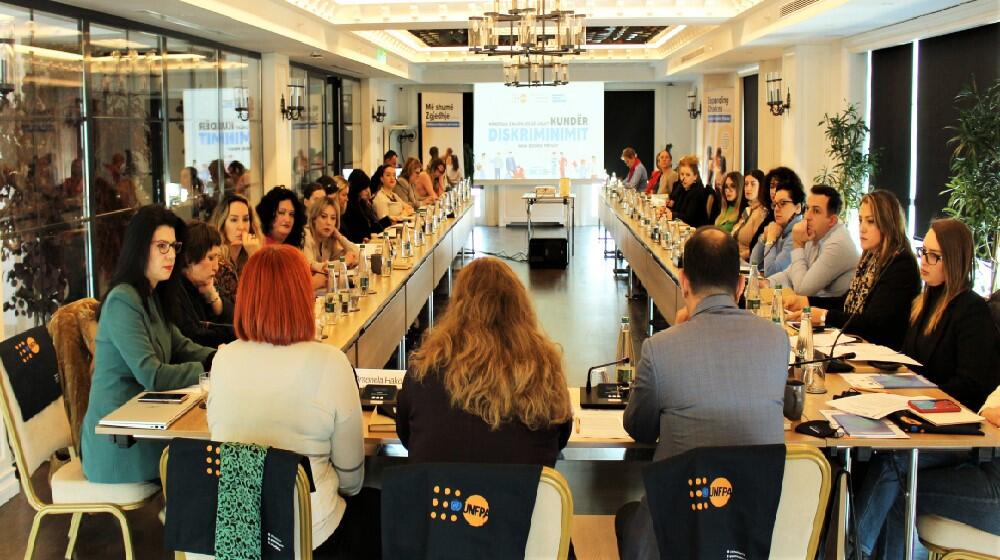Ensuring a stable balance between life and work remains a multisectoral collective effort that requires a long-term commitment from all interested actors. UNFPA Albania has been working for years to guarantee rights and choices for everyone, including respect for rights at the workplace.
Through the project "Expanding choices: Gender Responsive Family Policies for the Private Sector in the Western Balkans and Moldova" that UNFPA is implementing with the financial support of the Austrian Development Agency, it has been possible to promote the change and approach by private companies operating in Albania that apply gender-responsive family-friendly policies that prevent discrimination at the workplace and support young women, couples, and families.
Based on this objective, UNFPA in cooperation with the Commissioner for Antidiscrimination and the Women's Economic Chamber organized a roundtable: "Knowledge of the law against discrimination by private businesses". Participants included experts in the field and representatives of champion private enterprises operating in Albania that are committed to applying gender-responsible family policies to support their employees and families and want to improve workplaces for their staff.
The Head of UNFPA office in Albania, Dr. Manuela Bello, in her opening remarks emphasized the importance of interventions like the "Expanding choices" project, as they bring together local market companies around important social issues, but also help promote respect for employment, gender and family rights at the workplace.
"This project has so far achieved its main goal, i.e. encourage discussions at all levels for the application of gender-responsive family-friendly policies, not only in the private sector but also in the public sector. All actors involved have shown goodwill and acted positively when it comes to the application and improvement of such policies which benefit commercial activity as well", said Dr. Manuela Bello.
According to Dr. Bello, this project has laid important foundations for further actions and extension to other spheres, like identification of gaps in terms of discrimination of employees. We hope our studies and recommendations will help harmonize family-friendly policies for women and men.
For Mr. Robert Gajda, the Commissioner for Antidiscrimination, “The roundtable is very important towards increasing the knowledge of all actors on the issue, including the institution he leads. In recent years there has been an increasing trend of complaints to the Commissioner from the private sector. "Despite the type of discrimination, it is usually the economically disadvantaged people who become the subject of discrimination. The economic situation is the common denominator that generates discriminatory behaviors toward employees. What we have noticed is that often the entities that have been discriminatory have expressed a lack of knowledge about the rights and obligations towards the implementation of anti-discrimination policies towards employees and, for this reason, human resources play an important role in respecting anti-discrimination policies. Therefore, it is very important for us that this department is professionally and fully capacitated to handle discriminatory situations at the workplace", said Mr. Gajda.
The Women's Economic Chamber was represented by the Head, Mrs. Antonela Hako, who emphasized that "Gender division starts from the time of vocational education, where professions are divided into professions for girls and for boys. Fortunately, in recent years we have seen good practices of application of friendly family policies for employees in the private sector. Although the past challenges and those to be addressed still need a strong and unified voice to be resolved, it seems that important steps are being taken toward improving the situation. For us and many businesses run by women, the most important asset in our ventures are and will remain the employees, for whom we aim to enable a safe work environment free of any discrimination.", said Mrs. Hako.
Studies conducted by UNFPA show that 71% of employees in the private sector are not informed about family-friendly policies, while only 17% of private businesses have internal regulations for protection against discrimination at the workplace.
The project "Expanding Choices: Gender Responsive Family Policies for the Private Sector in the Western Balkans and Moldova" is implemented by UNFPA and funded by the Austrian Development Agency.


